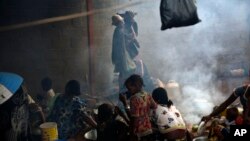YAOUNDE —
On the eve of World Refugee Day, the number of people fleeing the Central African Republic into Cameroon is increasing sharply. The refugees are escaping violence and famine caused by droughts and failure to farm since the conflict in the C.A.R. began in 2013.
Here in Garoua Boulaye, housewife Govegh Nadia says she and other Central Africans who left the C.A.R. were no longer running away from just sectarian violence - but famine.
She tells VOA there is no food at home due to a lack of rainfall and that is causing people to find whatever way they can over patrolled borders to get into Cameroon in order to eat and survive.
Most of the refugees appear to be women and children.
Fighting is also fueling famine, explains 43-year-old mother of four Pana Yogo. She says her church in Baoro was attacked by Seleka rebels in early June and her eldest son died in the attack.
"There is still war in my country with people killing others," she says. "People can no longer go to the farms due to the fear of violence and they must leave to stop their children dying of starvation."
But once the refugees get to Cameroon, they encounter new hardships - including local resentment.
Refugee Nzapaye Lynne says she could not bear the difficult conditions at a nearby UNHCR camp and decided to sell bread at the Garoua Boulaye market junction to take care of her sick husband and three children. But she says she is now being harassed by local officials.
“What do they want me to eat?" she asks, " It is horrible here in Cameroon.” She says locals are harassing her at the food market asking her to pay taxes and seizing her goods.
Local council official Meka Meka David tells VOA that the refugees are welcome but are not exempt from respecting the laws of their host country and must be monitored for everyone’s protection.
He says because the refugees are from a country in conflict, Cameroonians do not know if they will start fighting here and that people you consider friendly can turn out to be an enemy - which is why his country must be careful.
Most refugees here - like Dike Yayi - long for peace to return so that they may go home.
How can I love some other person’s country, she wonders, adding that she will not hesitate to go back to the C.A.R. once there is again calm.
The United Nations estimates more than a million people have fled their homes in the Central African Republic and half the population is in urgent need of food assistance as a result of violence during the past year.
Here in Garoua Boulaye, housewife Govegh Nadia says she and other Central Africans who left the C.A.R. were no longer running away from just sectarian violence - but famine.
She tells VOA there is no food at home due to a lack of rainfall and that is causing people to find whatever way they can over patrolled borders to get into Cameroon in order to eat and survive.
Most of the refugees appear to be women and children.
Fighting is also fueling famine, explains 43-year-old mother of four Pana Yogo. She says her church in Baoro was attacked by Seleka rebels in early June and her eldest son died in the attack.
"There is still war in my country with people killing others," she says. "People can no longer go to the farms due to the fear of violence and they must leave to stop their children dying of starvation."
But once the refugees get to Cameroon, they encounter new hardships - including local resentment.
Refugee Nzapaye Lynne says she could not bear the difficult conditions at a nearby UNHCR camp and decided to sell bread at the Garoua Boulaye market junction to take care of her sick husband and three children. But she says she is now being harassed by local officials.
“What do they want me to eat?" she asks, " It is horrible here in Cameroon.” She says locals are harassing her at the food market asking her to pay taxes and seizing her goods.
Local council official Meka Meka David tells VOA that the refugees are welcome but are not exempt from respecting the laws of their host country and must be monitored for everyone’s protection.
He says because the refugees are from a country in conflict, Cameroonians do not know if they will start fighting here and that people you consider friendly can turn out to be an enemy - which is why his country must be careful.
Most refugees here - like Dike Yayi - long for peace to return so that they may go home.
How can I love some other person’s country, she wonders, adding that she will not hesitate to go back to the C.A.R. once there is again calm.
The United Nations estimates more than a million people have fled their homes in the Central African Republic and half the population is in urgent need of food assistance as a result of violence during the past year.




